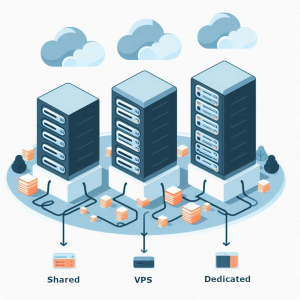
When launching a website, one of the most important decisions you’ll make is choosing the right hosting plan. The type of hosting you select impacts website performance, security, and scalability.
With so many options available, you might be wondering:
✅ Should I go for Shared Hosting to save costs?
✅ Is VPS Hosting the best balance between affordability and performance?
✅ Do I need a Dedicated Server for full control?
This guide breaks down the differences between Shared Hosting, VPS Hosting, and Dedicated Servers, helping you decide which one best suits your business needs.
1. What is Shared Hosting? 🏠
✅ Overview
Shared Hosting is like renting an apartment in a block—you share resources, bandwidth, and storage with multiple websites on the same server.
🔹 Pros of Shared Hosting
✔ Affordable – Ideal for small businesses and personal websites.
✔ User-Friendly – Managed setup with control panels like cPanel.
✔ Maintenance-Free – Hosting provider handles updates and security.
🔸 Cons of Shared Hosting
❌ Limited Performance – Traffic spikes on other sites may slow down your website.
❌ Less Control – No custom configurations or root access.
❌ Security Risks – If another website on the same server is compromised, it may impact yours.
🎯 Best For:
✔ Startups, personal blogs, small business websites, and portfolio sites.
2. What is VPS Hosting? 🚀
✅ Overview
VPS (Virtual Private Server) Hosting is like renting a private townhome—you still share a physical server, but with dedicated resources and better performance control.
🔹 Pros of VPS Hosting
✔ Better Performance – More CPU, RAM, and bandwidth allocation.
✔ Scalability – Can upgrade resources as your business grows.
✔ Greater Security – Websites are isolated from others on the same server.
🔸 Cons of VPS Hosting
❌ More Expensive Than Shared Hosting – Higher monthly costs.
❌ Technical Knowledge Needed – Requires some server management skills.
🎯 Best For:
✔ Medium-sized businesses, growing e-commerce stores, and high-traffic blogs.
3. What is Dedicated Server Hosting? 🏢
✅ Overview
Dedicated Server Hosting is like owning a house—you get full control of the entire server, with all resources exclusively for your website.
🔹 Pros of Dedicated Hosting
✔ Maximum Performance – No sharing means ultra-fast loading speeds.
✔ Full Customisation – Configure the server however you want.
✔ Highest Security – No risk from other websites.
🔸 Cons of Dedicated Hosting
❌ Most Expensive Option – Monthly costs can be high.
❌ Requires Advanced Management Skills – You need to maintain and secure the server yourself (unless managed hosting is chosen).
🎯 Best For:
✔ Large-scale businesses, high-traffic websites, and enterprises needing maximum control.
4. Key Differences: Shared vs. VPS vs. Dedicated 📊
| Feature | Shared Hosting | VPS Hosting | Dedicated Server |
| Performance | Low | Medium | High |
| Cost | Cheapest (£) | Mid-range (££) | Expensive (£££) |
| Security | Basic | Stronger | Maximum |
| Customisation | Limited | Moderate | Full Control |
| Scalability | Limited | Easy to Upgrade | Maximum |
| Best For | Small Websites | Growing Businesses | Large Enterprises |
5. Which Hosting Should You Choose? 🤔
✅ Choose Shared Hosting if: You’re starting a small website or blog on a budget.
✅ Choose VPS Hosting if: You need more power and control without the high costs of a dedicated server.
✅ Choose Dedicated Hosting if: You run a high-traffic business that demands top performance and security.
💡 Still unsure? Our experts at TownHost can help you pick the perfect hosting solution for your business.
Final Thoughts
Your hosting plan is the foundation of your website’s performance and security. Choosing the right one depends on your budget, business size, and technical needs.
At TownHost, we offer Shared, VPS, and Dedicated Hosting to suit all business sizes. Get in touch to find the best plan for you!
